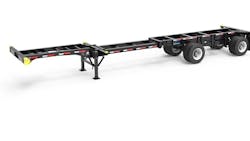Coalition looks to ‘level playing field’ with container chassis imports from China
[Editor’s note: This post first appeared in the August print edition of Trailer/Body BUILDERS. The Commission is scheduled to vote on the petition Sept. 11. Look for coverage of the decision, including a roundup of the testimony provided during the hearing, in the upcoming edition of the magazine.]
An ongoing dispute between the world’s largest container chassis manufacturer and US based competitors is now being looked into by the U.S. Department of Commerce.
The Coalition of American Chassis Manufacturers on July 30 filed petitions charging that unfairly traded imports of chassis from China are materially injuring the American container chassis industry. The petitions attempt to show that the state-supported Chinese industry is selling container chassis in the United States at less than fair value, dumped at rates up to 211.49%, distorting the U.S. market and resulting in the loss of significant manufacturing jobs in the USA.
The filing, which was made concurrently with the Commerce Department and the U.S. International Trade Commission (ITC), is in response to large and increasing volumes of “unfairly priced” Chinese chassis imports since 2017 that have injured American producers, the appeal contends. After a preliminary investigation, the Commission will vote on the whether the case warrants a complete investigation of the allegations and of the impact on the domestic trailer industry.
The petitioning companies include the five members of the Coalition of American Chassis Manufacturers: Cheetah Chassis Corp., Hercules Enterprises LLC, Pitts Enterprises Inc., Pratt Industries, Inc. and Stoughton Trailers LLC. The petitioners are represented by Wiley Rein LLP.
The petition concerns actions of CIMC, a Chinese state-owned enterprise (SOE) used by the Government of China to transfer manufacturing jobs out of the USA into China through subsidies, including tax breaks and discounted raw materials, and other unfair tactics. CIMC is one of the primary SOE used by the Chinese government to implement its "One Belt, One Road" state planning program and serves as an outlet for subsidized Chinese steel and other components, the petition contends.
"The action today seeks to put an end to the Government of China's unfair practices that have led to its dominance of the U.S. chassis market," Bob Wahlin, president and CEO of Stoughton Trailers, said. "US chassis manufacturers look forward to leveling the playing field so as to compete fairly. The coalition is optimistic that, following affirmative preliminary determinations by both the ITC and Department of Commerce, duties will begin to be collected by as early as the end of this year."
Frank Katz, chairman of Cheetah Chassis, emphasized the importance of protecting American industry and jobs.
"We are proud to be part of a coalition that wants to stand up for American manufacturing and American labor to fight off the Government of China's efforts to take our jobs,” Katz said. "For years, our companies have lost massive amounts of sales to unfairly traded, dumped, and subsidized imports from China, and our people have suffered as a result. It's time to stand up for American manufacturing to take on these illegally traded Chinese products."
As a result of dumped and subsidized imports from China, U.S. producers have suffered significant declines in production, shipments, profits, and employment, as detailed in the petition. Coalition members have underutilized manufacturing capacity and idled employees in states across the heartland of America.
"Dumped and subsidized imports of chassis from China have injured the U.S. industry and its workers," said Robert E. DeFrancesco, III, partner in Wiley's International Trade Practice and counsel to the petitioners. "We urge Commerce and the USITC to thoroughly investigate these unfair trade practices and effectively apply the trade laws to dumped and subsidized chassis from China."
CIMC response
CIMC Vehicles (Group) Co. Ltd., in a notice to shareholders, said the company “will take all necessary measures to actively respond” to the investigation “to safeguard the legitimate rights and interests” of the Group and the shareholders.
“The Group has been always following the trading principle of fair competition to develop its global semi-trailer business and committed to providing quality products and services to the Group’s global customers, while attaching great importance to the healthy development of the industries in the countries and regions where the Group’s customers are located,” the statement reads.
CIE Manufacturing Inc., headquartered in South Gate, CA, is the group’s North American presence.
“At CIE Manufacturing we remain fully committed to our customers and meeting their container chassis needs at every level, and will continue our mission to bring the safest, highest quality products to the intermodal market to fulfill our vital responsibility to the transportation industry,” Executive Vice President Trevor Ash said in response to a request for comment from TBB.
Formerly CIMC Intermodal Equipment LLC, CIE rebranded in March emphasing the intent to create full manufacturing capabilities at its facilities in South Gate, CA and Emporia, VA. The company—which has largely assembled chassis kits manufactured in China by CIMC—was hit with a 25% tariff on its products during the ongoing US/China trade dispute.
“The original motivation to pursue this manufacturing move was the trade war between the US and China, which affected the cost of our chassis,” Frank Sonzala, CEO of CIE, said at the time. “When the [initial] tariff was 10%, it really didn’t disrupt our business at all. We all figured out how to work with the 10% and get more efficient and so on. But at [the subsequent tariff rate of] 25%, the customer basically had to buy five chassis to get four—and that made a big difference.
“And it also made a big difference in the buyer’s psyche, the idea that what’s going on here may never end and it’s going to be really hard to do business in the intermodal sector.”
CIMC was to be the beneficiary of a tariff exclusion request filed by the American Trucking Associations a year ago and supported by intermodal fleets and chassis leasing companies. The request contended that fleets were being hurt by the tariff-boosted chassis pricing, and that US suppliers did not have the capacity to meet demand in a timely fashion.
Competing US-based chassis manufacturers—including members of the coalition asking for the investigation—successfully opposed the exclusion. The US companies argued that they had significant chassis capacity that sat idle in 2018 due to a “glut” of trailers from China, imported to get ahead of the tariff charges—and those units, with a short lead time for delivery, made for more attractive replies to bid requests and for an unfair marketplace. The Office of the US Trade Representative denied the ATA request last November.
Details
Antidumping and Countervailing Duties: Antidumping duties are intended to offset the amount by which a product is sold at less than fair value, or "dumped," in the United States. The margin of dumping is calculated by Commerce. Estimated duties in the amount of the dumping are collected from importers at the time of importation. Countervailing duties are intended to offset unfair subsidies that are provided by foreign governments and benefit the production of a particular good. The USITC, an independent agency, will determine whether the domestic industry is materially injured or threatened with material injury by reason of the unfairly traded imports.
Next Steps: Commerce will determine whether to initiate the investigations within 20 days of the filing, and the USITC will reach a preliminary determination of material injury or threat of material injury within 45 days. The entire investigative process will take approximately one year, with final determinations of dumping, subsidization, and injury likely occurring in mid-2021. However, duties can attach to imports of the subject chassis as of the time of the preliminary determinations in the case, or even earlier.
Product Description: The products covered by these petitions are chassis and subassemblies thereof, whether finished or unfinished, whether assembled or unassembled, whether coated or uncoated, regardless of the number of axles, designed primarily for use in the carriage of containers, or other payloads (including self-supporting payloads) that can be attached by twistlocks, slide pins, or similar attachment devices, for road, marine roll-on/roll-off (RORO) and/or rail transport. Chassis are typically, but are not limited to, rectangular framed trailers with a suspension and axle system, wheels and tires, brakes, a lighting and electrical system, a coupling for towing behind a truck tractor, and a locking system or systems to secure the shipping container or containers attached to the chassis.
About the Author
Kevin Jones
Editor
Kevin has served as editor-in-chief of Trailer/Body Builders magazine since 2017—just the third editor in the magazine’s 60 years. He is also editorial director for Endeavor Business Media’s Commercial Vehicle group, which includes FleetOwner, Bulk Transporter, Refrigerated Transporter, American Trucker, and Fleet Maintenance magazines and websites.
Working from Beaufort, S.C., Kevin has covered trucking and manufacturing for nearly 20 years. His writing and commentary about the trucking industry and, previously, business and government, has been recognized with numerous state, regional, and national journalism awards.

